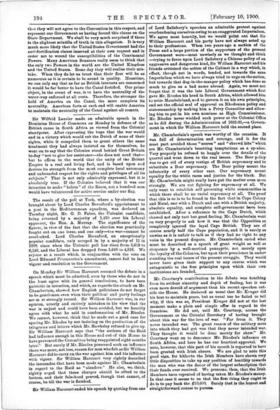On Monday Sir William Harcourt resumed the debate in a
speech which must be admitted, even by those who do not in the least agree with its general conclusions, to have been patriotic in intention, and which, as regards the attack on Mr. Chamberlain, showed how English politicians do not forget to be gentlemen even when their political and party feelings are m at strongly roused. Sir William Harcourt was, in our opinion, utterly and entirely mistaken in his view that the war is unjust and could have been avoided, but we heartily agree with what he said in condemnation of Mr. Rhodes. We cannot, however, think that he made out a good case for sparing Mr. Rhodes by not insisting on the production of the telegrams and letters which Mr. Hawksley refused to give up. Sir William Harcourt says that "the authors of the Raid had influence enough in this House and out of this House to have prevented the Committee being reappointed eight months later." But surely if Mr. Rhodes possessed such an influence there was more, not less, reason for men who felt as Sir William Harcourt did to carry on the war against him and his influence with vigour. Sir William Harcourt very rightly described the innuendos that have been made against Mr. Chamberlain in regard to the Raid as "slanders." He also, we. think, rightly urged that these charges should be sifted to the bottom, and their falsehood proved, though that cannot, of course, be till the war is finished.


































 Previous page
Previous page